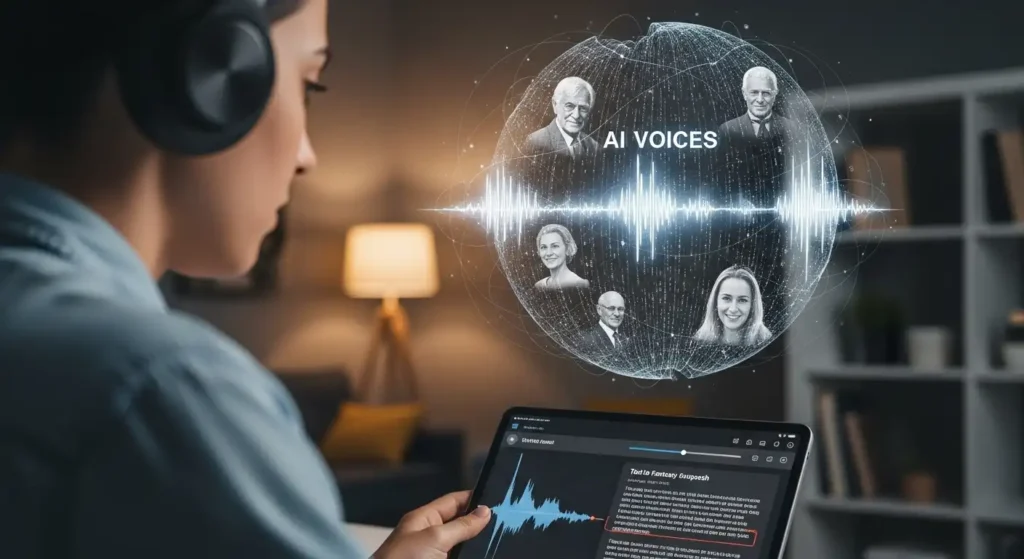Introduction: The Rise of AI Voices in Audiobooks
Audiobooks are booming, with millions of listeners worldwide turning to them for entertainment, education, and multitasking convenience. In 2025, a new development is transforming the industry: AI-narrated audiobooks. Instead of relying solely on human voice actors, publishers and platforms are increasingly experimenting with artificial intelligence to bring stories to life.
But what does this shift mean for readers, authors, and narrators? This guide explores the benefits, concerns, and ethical debates surrounding AI voices in audiobooks.
What Are AI-Narrated Audiobooks?
 AI-narrated audiobooks are recordings in which synthetic voices—created through advanced machine learning—read the text. These voices are trained on massive datasets to mimic human tone, rhythm, and intonation. Some platforms now offer customizable voices, allowing publishers to choose accents, pacing, or even emotional delivery styles.
AI-narrated audiobooks are recordings in which synthetic voices—created through advanced machine learning—read the text. These voices are trained on massive datasets to mimic human tone, rhythm, and intonation. Some platforms now offer customizable voices, allowing publishers to choose accents, pacing, or even emotional delivery styles.
Unlike robotic voices of the past, today’s AI narrators sound increasingly natural, sometimes nearly indistinguishable from professional human voice actors.
Why AI Narration Is Growing in 2025
Several factors are fueling the rise of AI narration this year:
- Lower production costs: Traditional audiobook production can cost thousands of dollars per title. AI cuts costs significantly.
- Faster turnaround: AI voices can produce an entire audiobook in days instead of weeks.
- Expanding accessibility: Indie authors and small publishers now have affordable ways to release audiobooks.
- Customization: AI allows flexible adjustments—slower reading speeds, alternative voices, and even multiple language outputs.
These advantages make AI narration attractive in an industry where demand is outpacing supply.
Benefits for Readers
For listeners, AI-narrated audiobooks offer several perks:
- More choices: With lower costs, publishers can produce more audiobooks, especially for niche titles that might not justify expensive human narration.
- Lower prices: Many AI-narrated titles are cheaper, making audiobooks more accessible to budget-conscious readers.
- Consistency: AI voices maintain uniform tone and clarity, reducing issues like uneven pacing or mispronunciation.
- Multilingual support: Some AI systems can narrate in multiple languages, broadening global access.
For casual listeners, these advantages make AI narration an appealing option.
Concerns and Controversies
Despite the benefits, AI narration raises serious concerns within the publishing and voice acting communities:
- Job displacement: Human narrators worry that AI may reduce demand for their work, particularly for midlist and indie projects.
- Lack of nuance: While AI can mimic tone, it often struggles with the emotional depth, humor, or subtle pauses that bring characters to life.
- Ethical use of voices: Some AI systems train on datasets that include recordings of human narrators—sometimes without clear consent.
- Listener experience: Audiobook fans accustomed to expressive performances may find AI voices flat or distracting.
These concerns fuel ongoing debates about where AI fits in publishing’s future.
The Human Touch: Why Narrators Still Matter
 While AI narration is advancing quickly, professional human narrators bring something irreplaceable: performance artistry. A skilled actor interprets characters, accents, and emotional beats in ways that AI struggles to replicate.
While AI narration is advancing quickly, professional human narrators bring something irreplaceable: performance artistry. A skilled actor interprets characters, accents, and emotional beats in ways that AI struggles to replicate.
Many listeners argue that human narration transforms a book into an experience, while AI simply delivers the text. For bestselling or character-driven titles, publishers continue to invest in human voices to preserve that magic.
How Authors Are Using AI Narration
Indie authors are among the biggest adopters of AI narration. For self-published writers, producing a professional audiobook was once prohibitively expensive. AI now makes it possible to release audio versions alongside ebooks and print editions without enormous upfront costs.
Some hybrid approaches are also emerging: authors use AI for draft narrations to test pacing or check flow, then hire human narrators for the final release.
What It Means for Listeners in 2025
So what does this all mean for you as a reader? In 2025, you’re likely to encounter both AI- and human-narrated audiobooks in your library or bookstore apps. Here’s how to approach them:
- Check the listing: Many platforms now disclose whether a book is AI-narrated.
- Sample first: Listen to a preview before buying to ensure you enjoy the voice.
- Support narrators: For favorite performers, continue purchasing human-narrated titles to sustain their work.
- Experiment: Use AI narration for nonfiction, technical, or reference works where performance may matter less, and save character-driven novels for human narrators.
The Future of AI Narration
The future likely holds a blend of human and AI narration. Rather than replacing professionals entirely, AI may take on specific niches: academic texts, indie publications, or multilingual translations. Human narrators will remain essential for emotionally rich fiction and high-profile releases.
For readers, this means greater access, more affordable options, and broader diversity in what gets produced. The key will be transparency, ensuring that listeners know whether they’re hearing a human or an AI voice.
Final Thoughts
AI-narrated audiobooks in 2025 are a double-edged sword: they expand accessibility and choice while raising important ethical and creative questions. As the technology evolves, the balance between efficiency and artistry will define how we listen to stories in the years ahead.
Whether you embrace AI narration or prefer the human touch, the audiobook landscape has never been richer. Explore our book recommendations for your next great listen and decide for yourself how AI shapes your reading journey.
